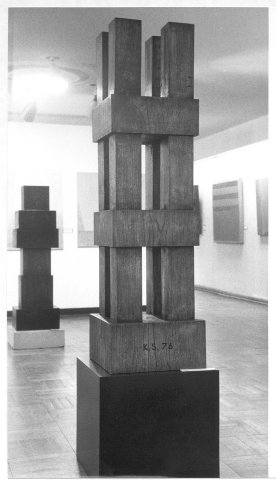|
| | Galerija - Chicago 1980
 |
Simplicity is not a goal said Brancusi, but one arrives at
simplicity in spite of oneself as on approaches the real meaning of
things. In the sculpture of Klaus Steinbrenner we find exemplified in the
most rewarding way that process of which Brancusi spoke, that search for
underlying reality, that stripping away of all that is not needed, until
we arrive at that heart of the matter which is art.
Steinbrenner takes for his use the most basic elements at the disposal
of the artist: the vertical, the horizontal, the flat plane which, in the
three dimensional world of the sculptor, becomes the cube. He takes the
simplest of materials: Indiana limestone. elmwood, pine, walnut, and deals
with it in the most direct way - carving, or if seer size and weight
dictate, constructing his cubes, meticulously cutting and fitting each
side, until his statement is made. It is an art of deceptive simplicity,
pleasing, compelling and immediate when first confronted, then revealing
to the persevering eye riches of an unsuspected depth and complexity which
continue to unfold for as long as we care to seek them. This continuing
revelation of pleasure is one of the greatest and rarest joys art has to
offer. |
| Within the tradition of geometric abstraction,
which is almost as old as this century, and particular the sculpture of
that tradition, Steinbrenner's work displays a unique concern with the
beginnings, the primal form in his first stage of his work ... what he
calls the block. While most sculpture of this persuasion might be
described as additive, i.e., built up bit by bit - even that in which the
material is carved away to reveal the final form - Steinbrenner sees his
work as something quite different. He sees it not as a process of moving
into the block but as a process of taking away, taking from it in a way
which opens it, but keeps the integrity of the block always. The sides of
the block are always there, closed, whole, real. And there is the crux of
it, the sense on has of beginnings and endings endlessly revealed, the
whole and its parts the real meaning of things.
Oscar Amberson |
|